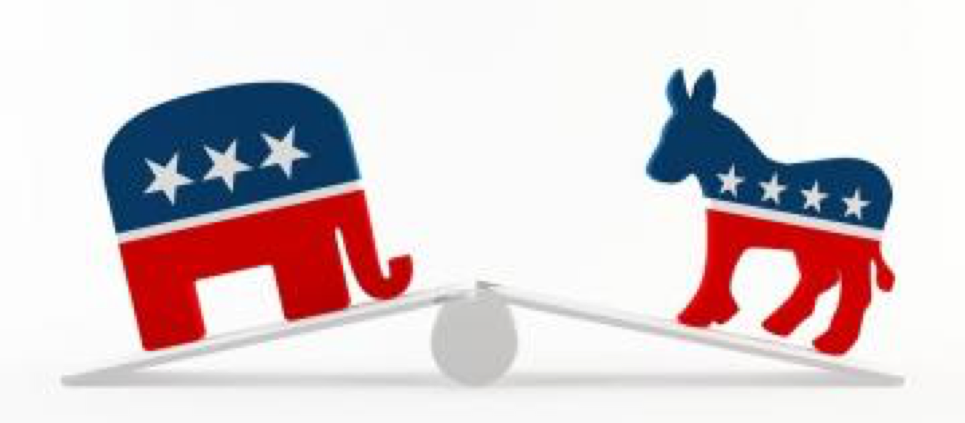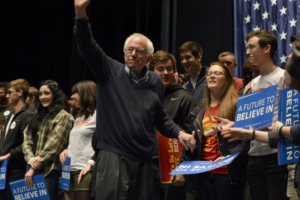Third Parties, Hillary Hecklers, and the New Consumer
Here’s What You Need to Know
Some of the #NeverTrump supporters are floating the possibility of a third party candidate, and if Hillary Clinton is not successful in bringing Sanders supporters to her side after the nomination process, some on the Left may consider a similar effort. So is it even possible, at this point in the cycle, for someone to mount a third party bid? The answer lies somewhere between not likely and completely impossible.
For a third party candidate to rise to prominence they would have to overcome several key hurdles:
- Ballot Access Without Money, Time, or Expertise: A presidential campaign is already an expensive process requiring roughly a billion dollars. For a third party candidate, the price tag would be even higher to account for the monumental effort required to get on the ballot in all fifty states. Time is also a factor. Filing deadlines for independent candidate ballot access begin in July and filing deadlines for other political parties have already passed in some states. Lastly, only the political know-how one would find in a major party organization would be able to guide a candidate through the 50 different processes to get on the ballot especially in such a short time frame.
- Sorry, You’re Already A Loser: A number of states have “sore loser” laws that prohibit candidates who failed to win their party’s nomination from running for that office as an independent or as another party’s candidate in the same election.
- I Like You, But You Can’t Win: Assuming a candidate could address the above challenges, they still need a path to victory. Getting American voters to like you is one thing; convincing them they are not wasting their vote is a different story. Any real third party candidate would need a VERY convincing argument for how they can get to 270 electoral votes.
- Who Could Do It? The only parties that could potentially mount a viable third party candidate are the Libertarian and Constitution parties. That said, neither party has a nominee yet and any candidates they pick would still have to overcome the ideological issues that have traditionally kept these parties at the fringe of the political arena – not to mention the high bar to make it into the televised debates and get significant media attention.
- If Bloomberg Can’t Do It, Can Anyone? In March, former New York City Mayor and billionaire Michael Bloomberg ruled out running as an independent citing the functional deadline to get on ballots as one of many reasons. So if a possible candidate who had the finances, high national name ID, political experience, and his very own global media empire feels a third party run is impossible, it seems unlikely anyone else is going to be able to make it work.
News You Can Use
DEFINING DONALD
Successful 21st century campaigns thrive on defining their opponents before they can define themselves. No one can has taken this mantra more to heart than Donald Trump, dubbing his opponents “Lyin’ Ted”, “Liddle Marco”, “Low energy Jeb,” and now “Crooked Hillary.” Mark Leibovich of The New York Times recently spoke with Trump about how he takes aim at his political opponents. The DNC is trying to match Trump’s magic touch on branding, referring to Trump as “Dangerous Donald,” though Leibovich finds that a “lame effort.”
Subscribe to Receive Insights
"*" indicates required fields
CORPORATE TROLLING
Ever wonder what would happen if internet trolls took over a multinational corporation’s twitter account? It might look something like car rental giant Avis’ new aggressive twitter campaign against chief rival Hertz. Avis’ twitter account has started directly responding to Hertz customers who tweet complaints of poor service with offers of discounts, upgrades, and status match. Could this style of bareknuckle marketing become the norm?
TOO TAX EFFECTIVE?
Cries for lowering the U.S. corporate tax rate can be heard from Capitol Hill to Wall Street, but no one seems to be able to agree on how to get there. Tax Analysts reporter Jeremy Scott argues that’s because the statutory rate is high but the effective rate for many companies is considerably lower. As Scott writes, “The low effective tax rate is why there is no consensus in the business community supporting 1986-style corporate tax reform. Sure, every corporation would love a lower statutory rate. But companies that benefit from deferral, lax transfer pricing rules, separate company accounting, and bonus depreciation don’t want to sacrifice to get there.” Until a consensus emerges, tax reform will prove difficult.
HILLARY HECKLERS BEWARE
The internet has long been a place for unbridled, unfiltered, and often unwarranted criticism. But a new pro-Hillary Clinton super PAC seeks to bring order to the chaos. The “Correct the Record” super PAC is spending roughly $1 million to “find and confront social media users who post unflattering messages about the Democratic front-runner.” While the Clinton campaign has suffered from a lack of organic online engagement, especially when compared to Bernie Sanders and Donald Trump, “using a super PAC to create a counterweight to movements that have sprung up organically is another reflection of the campaign’s awkwardness with engaging online, digital pros” told the Los Angeles Times.
BETTER CONSUMERS, WORSE ECONOMY
Why has the post-financial crisis economic recovery been so weak? The Washington Post’s Robert Samuelson suggests the economy’s “sluggishness reflects a profound psychological transformation of American shoppers.” The new consumer saves more, spends prudently, manages their credit, and is “the real drag on the economy.” Even as the economy slowly improves, the psychological scars of the Great Recession may have caused a paradigm shift among consumers, creating a “new normal” on the demand side of the curve.
ENDING HOMEOWNERS’ DOUBLE TAXATION
Currently, U.S. home owners living in home owner association communities pay fees to the association as well as local property taxes even though in practice, both payments often fund some of the same services. A measure put forth by Republican Congresswoman Barbara Comstock (R-Va.) and Democratic Rep.s Anna Eshoo (D-Ca.) and Mike Thompson (D-Ca.) would allow those home owner association fees to become tax deductible. For the legislation to catch fire, it will need to become more clear how the Congressional Budget Office may score this proposal and how this might fit into a larger comprehensive tax reform regarding housing and state tax deductions.
LATE TO THE LABOR PARTICIPATION PARTY
While some have been sounding the alarm on America’s low labor force participation for months and years, former chair of President Obama’s Council of Economic Advisers Alan Kruerger is now free from the shackles of politics and acknowledging this economic reality. Krueger said the latest decline in long-term unemployment may be a bad thing because, “the longer a person was unemployed, the lower the odds that they would find a job in a given month—and the higher the odds that they would exit the labor market.” This means the economic uncertainty and angst that has driven much of the support of Bernie Sanders and Donald Trump is going to remain a factor and economic indicators beyond simply unemployment and jobs created will play a large part in campaign debate.
OBAMA’S MISSING MILLION
During the 2012 presidential campaign President Obama made a lot of promises, but few were as specific as his goal to create 1 million new manufacturing jobs by the end of 2016. It now appears the President will fall well short of that target, with only 331,000 manufacturing jobs created since the start of Obama’s second term. While there have been many factors contributing to the lackluster growth in manufacturing, Obama’s own policies, from increased regulatory red tape that costs even small manufacturers $35,000 per year per employee to unfriendly labor policies, have left the President attempting to grow an industry after tying his own hand behind his back.
Mark Your Calendars
Tuesday, May 17: Kentucky Democratic Primary, Oregon Primaries
Tuesday, May 24: Washington Republican Primary
Subscribe here to get TL;DR in you inbox each week.



